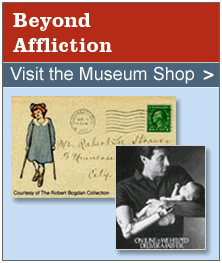Education: Lesson Details
Overview
During the 1840s and 1850s, Dorothea Dix was advocating reforms on behalf of people with mental disabilities in poorhouses, prisons, and asylums. Dix succeeded in gaining support from state legislators for the construction or enlargement of asylums. Her chief allies were nondisabled asylum superintendents and humanitarian reformers. Unlike today’s disability advocates who are either themselves disabled or at least take seriously the wishes of people with disabilities, Dix did not represent a grass-roots movement of people with psychiatric disabilities. Were her efforts ultimately contrary to their best interests?
This lesson addresses this important question. Students examine the historical voices of advocates like Dorothea Dix, of people with psychiatric disabilities, and of caregivers in the specialized institutions called asylums. During the nineteenth century and beyond, people declared “insane” were not allowed to participate formally in political or legal matters. Their rights to own and inherit property, to marry, and to have custody of children were often curtailed or denied. Their civic voices were usually ignored or silenced. This lesson is an effort to uncover those voices.
Deciphering the multiple voices in the historical evidence, voices not limited to those of Dix and her political allies, is the aim of this lesson. Students will examine the exposé of a former patient of the Maine Insane Hospital and the writings of people confined at the New York State Insane Asylum at Utica in their literary journal, The Opal. They will also read comments by the medical professionals who were in charge of institutions. (Note that this lesson does not examine one other important group, families and friends who commonly acted as caregivers in private settings.) “Hearing Voices: Did Benevolence Listen?” can lead students to a more complex understanding of reform movements and the lives of ordinary Americans before the Civil War.
Questions To Consider
1. Did Dorothea Dix incorporate the voices of people with disabilities or those of their families into her report about care for the insane?
2. What were the motivations of the various writers excerpted in this lesson?
3. Did the interests of the individual people in this lesson mesh? What alliances were possible? What conflicts were likely?
4. How did the writers establish their credibility and authority? To what audience were the writers directing their words? How did the creator of each of these documents deal with issues of freedom, power, confinement, and coercion? 5. Does the presence of evidence from people with mental disabilities change the picture of Dorothea Dix's reforms? Do historians face unusual problems when they use primary sources from people with psychiatric disabilities, people whose judgments, perceptions, and stability may be in doubt? Can such evidence still be of value? How do we identify authenticity when the evidence is contradictory or ambiguous?






